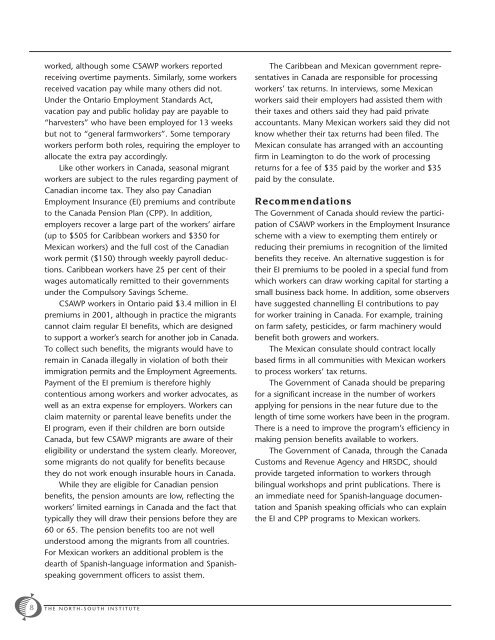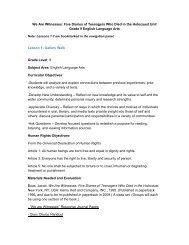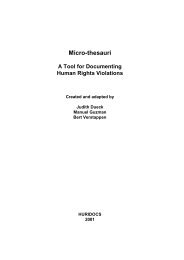Migrant Workers Canada
Migrant Workers in Canada - The North-South Institute
Migrant Workers in Canada - The North-South Institute
- No tags were found...
Create successful ePaper yourself
Turn your PDF publications into a flip-book with our unique Google optimized e-Paper software.
worked, although some CSAWP workers reported<br />
receiving overtime payments. Similarly, some workers<br />
received vacation pay while many others did not.<br />
Under the Ontario Employment Standards Act,<br />
vacation pay and public holiday pay are payable to<br />
“harvesters” who have been employed for 13 weeks<br />
but not to “general farmworkers”. Some temporary<br />
workers perform both roles, requiring the employer to<br />
allocate the extra pay accordingly.<br />
Like other workers in <strong>Canada</strong>, seasonal migrant<br />
workers are subject to the rules regarding payment of<br />
Canadian income tax. They also pay Canadian<br />
Employment Insurance (EI) premiums and contribute<br />
to the <strong>Canada</strong> Pension Plan (CPP). In addition,<br />
employers recover a large part of the workers’ airfare<br />
(up to $505 for Caribbean workers and $350 for<br />
Mexican workers) and the full cost of the Canadian<br />
work permit ($150) through weekly payroll deductions.<br />
Caribbean workers have 25 per cent of their<br />
wages automatically remitted to their governments<br />
under the Compulsory Savings Scheme.<br />
CSAWP workers in Ontario paid $3.4 million in EI<br />
premiums in 2001, although in practice the migrants<br />
cannot claim regular EI benefits, which are designed<br />
to support a worker’s search for another job in <strong>Canada</strong>.<br />
To collect such benefits, the migrants would have to<br />
remain in <strong>Canada</strong> illegally in violation of both their<br />
immigration permits and the Employment Agreements.<br />
Payment of the EI premium is therefore highly<br />
contentious among workers and worker advocates, as<br />
well as an extra expense for employers. <strong>Workers</strong> can<br />
claim maternity or parental leave benefits under the<br />
EI program, even if their children are born outside<br />
<strong>Canada</strong>, but few CSAWP migrants are aware of their<br />
eligibility or understand the system clearly. Moreover,<br />
some migrants do not qualify for benefits because<br />
they do not work enough insurable hours in <strong>Canada</strong>.<br />
While they are eligible for Canadian pension<br />
benefits, the pension amounts are low, reflecting the<br />
workers’ limited earnings in <strong>Canada</strong> and the fact that<br />
typically they will draw their pensions before they are<br />
60 or 65. The pension benefits too are not well<br />
understood among the migrants from all countries.<br />
For Mexican workers an additional problem is the<br />
dearth of Spanish-language information and Spanishspeaking<br />
government officers to assist them.<br />
The Caribbean and Mexican government representatives<br />
in <strong>Canada</strong> are responsible for processing<br />
workers’ tax returns. In interviews, some Mexican<br />
workers said their employers had assisted them with<br />
their taxes and others said they had paid private<br />
accountants. Many Mexican workers said they did not<br />
know whether their tax returns had been filed. The<br />
Mexican consulate has arranged with an accounting<br />
firm in Leamington to do the work of processing<br />
returns for a fee of $35 paid by the worker and $35<br />
paid by the consulate.<br />
Recommendations<br />
The Government of <strong>Canada</strong> should review the participation<br />
of CSAWP workers in the Employment Insurance<br />
scheme with a view to exempting them entirely or<br />
reducing their premiums in recognition of the limited<br />
benefits they receive. An alternative suggestion is for<br />
their EI premiums to be pooled in a special fund from<br />
which workers can draw working capital for starting a<br />
small business back home. In addition, some observers<br />
have suggested channelling EI contributions to pay<br />
for worker training in <strong>Canada</strong>. For example, training<br />
on farm safety, pesticides, or farm machinery would<br />
benefit both growers and workers.<br />
The Mexican consulate should contract locally<br />
based firms in all communities with Mexican workers<br />
to process workers’ tax returns.<br />
The Government of <strong>Canada</strong> should be preparing<br />
for a significant increase in the number of workers<br />
applying for pensions in the near future due to the<br />
length of time some workers have been in the program.<br />
There is a need to improve the program’s efficiency in<br />
making pension benefits available to workers.<br />
The Government of <strong>Canada</strong>, through the <strong>Canada</strong><br />
Customs and Revenue Agency and HRSDC, should<br />
provide targeted information to workers through<br />
bilingual workshops and print publications. There is<br />
an immediate need for Spanish-language documentation<br />
and Spanish speaking officials who can explain<br />
the EI and CPP programs to Mexican workers.<br />
8 THE NORTH-SOUTH INSTITUTE





